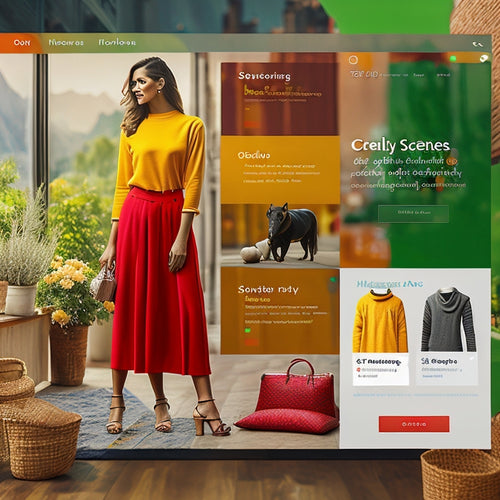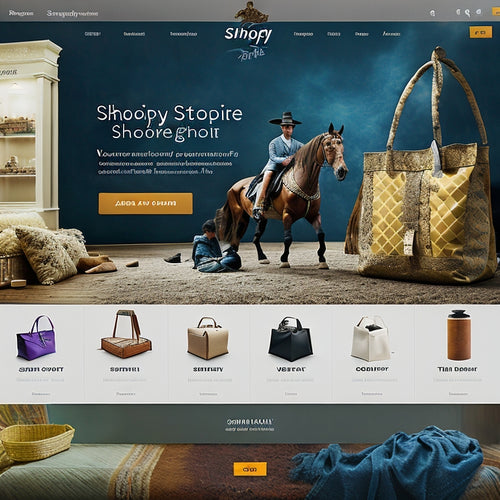
10 Best Online Course Marketing Strategies for Ecommerce
Share
You've got high-quality online courses and want to reach ecommerce customers, driving revenue and growth. To succeed, you'll need a solid marketing strategy. Start by leveraging user-generated content and running targeted social media ads to grab attention. Next, offer free trials or demos to build trust, and partner with influencers and bloggers to expand your reach. Create valuable content upgrades, host live webinars, and develop affiliate marketing programs to convert browsers into buyers. Don't forget to optimize course landing pages and use retargeting and remarketing tactics to maximize results. You're just a step away from revealing even more powerful marketing secrets that can take your ecommerce business to the next level.
Key Takeaways
• Leverage user-generated content to showcase customer experiences and build community engagement for online courses.
• Run targeted social media ads to reach ideal audiences, increase brand awareness, and drive sales for ecommerce courses.
• Offer free trials or demos to let users test courses before committing and gather valuable feedback for improvement.
• Partner with influencers and bloggers to tap into their massive followings, drive sales, and build credibility for online courses.
• Create valuable content upgrades to enhance the learning experience and optimize course landing pages for higher conversion rates.
Leverage User-Generated Content
By encouraging your customers to share their experiences with your online course, you can create a powerful marketing tool that builds trust and credibility with potential buyers. This is because user-generated content is seen as authentic and trustworthy, allowing potential customers to get a genuine sense of what your course has to offer.
To leverage this, encourage reviews from satisfied customers and showcase them on your website or social media channels. This won't only build trust but also increase conversions.
Additionally, build community engagement by creating a private Facebook group or forum where customers can share their progress, ask questions, and interact with each other. This will foster a sense of belonging and encourage customers to share their experiences with others.
Run Targeted Social Media Ads
You can now take your online course marketing to the next level by running targeted social media ads that reach your ideal audience, increasing brand awareness, and driving sales. To achieve this, you need to master ad targeting and audience segmentation. Identify your ideal customer based on demographics, interests, and behaviors, and create ad groups that cater to each segment.
Craft compelling ad creative that resonates with your audience, using high-quality visuals and persuasive copy. Optimize your ads for maximum ROI by testing different variations, tracking performance metrics, and adjusting your strategy accordingly. Use social media platforms' built-in analytics tools to monitor your ad performance and make data-driven decisions.
Offer Free Trial or Demo
When you offer a free trial or demo of your online course, you're giving potential customers the opportunity to test before committing to a purchase. This allows them to experience the benefits of your course firsthand, increasing the chances they'll become paying customers.
Test Before Committing
How can you convince potential customers to commit to your online course without giving them a taste of what's in store? The answer lies in offering a free trial or demo. This strategy allows you to test your course's appeal before asking customers to commit to a full purchase.
By providing a sample of your content, you're giving potential customers a chance to experience the value you're offering. This can be especially effective when combined with A/B testing and market research to refine your marketing approach.
Another benefit of offering a free trial or demo is that it provides you with valuable user feedback. You can use this feedback to make adjustments to your course content, marketing messaging, or even your pricing strategy.
Additionally, conducting competitor analysis can help you identify gaps in the market and differentiate your course from others. By testing before committing, you're not only building trust with potential customers but also gathering valuable insights to inform your marketing strategy.
Experience the Benefits
By offering a free trial or demo, potential customers get to experience the benefits of your online course firsthand, allowing them to see the value it provides and increasing the likelihood of a sale. This strategy is especially effective when you have a high-ticket item or a complex course with many features. You'll give your customers a chance to try before they buy, reducing the risk of buyer's remorse and increasing trust in your brand.
Use this opportunity to showcase the success stories and case studies of previous customers who've seen significant results from your course. Share customer testimonials and ROI analysis to demonstrate the real-world impact of your online course. By doing so, you'll create social proof and credibility, making it easier for potential customers to make a purchasing decision.
With a free trial or demo, you're not just selling a product – you're giving customers a taste of the transformation they can expect from your course.
Partner With Influencers and Bloggers
You can tap into the massive followings of social media influencers and bloggers in your niche by partnering with them to promote your online course. This strategy can help you reach a wider audience, build credibility, and drive sales.
Influencer collaborations and blogger partnerships can be particularly effective, as they allow you to tap into the trust and loyalty that influencers have built with their followers. Consider offering brand ambassadorships or content sponsorships to incentivize influencers to promote your course.
This can include providing them with free access to your course, offering a commission for each sale generated through their unique referral link, or even featuring them in your marketing materials. By partnering with influencers and bloggers, you can increase your online course's visibility, credibility, and ultimately, its revenue.
Just remember to choose influencers who align with your target audience and course topic, and be clear about what you're asking them to promote and how they'll benefit from the partnership.
Create Valuable Content Upgrades
As you create valuable content upgrades, you're not just adding more stuff to your online course - you're enhancing the learning experience for your students and revealing exclusive insights that set your course apart from the competition.
By doing so, you're building trust and credibility with your audience, which can lead to increased engagement and ultimately, more sales.
Enhance Learning Experience
To take your online course to the next level, craft valuable content upgrades that complement your lessons, providing learners with actionable tools and resources to reinforce their understanding. By doing so, you'll create an immersive learning experience that sets your course apart from the competition.
One effective way to enhance the learning experience is by incorporating interactive quizzes that test learners' knowledge and provide personalized feedback. This not only helps learners identify areas for improvement but also keeps them engaged and motivated throughout the course.
You can also create downloadable resources, such as worksheets or cheat sheets, that learners can use to apply their newfound knowledge in real-world scenarios. Additionally, consider offering exclusive access to expert interviews, webinars, or live sessions that provide learners with valuable insights and networking opportunities.
Unlock Exclusive Insights
Exclusive insights await learners who explore further into your course content, and valuable upgrades can reveal these hidden gems.
By creating content upgrades, you're offering learners a reason to engage more deeply with your material, which can lead to increased customer retention and a better understanding of your target audience.
For instance, you could offer a downloadable worksheet that accompanies a lesson on data analytics, providing learners with a hands-on way to apply their new skills.
Or, you could create a bonus video that delves deeper into a topic, such as competitive analysis, and provides learners with actionable insights they can apply to their own business.
By doing so, you're not only providing more value to your learners but also gathering valuable market research that can help you refine your course content and marketing strategy.
Utilize Email Marketing Campaigns
Your email list is a goldmine of potential customers, and crafting targeted email marketing campaigns can help you tap into it and drive sales for your ecommerce course. To maximize the potential of your email list, it's essential to create personalized recommendations that resonate with your audience. This can be achieved through A/B testing, which allows you to experiment with different subject lines, email content, and calls-to-action to see what works best.
| Email Marketing Strategy | Benefits |
|---|---|
| Personalized recommendations | Increased engagement and conversions |
| A/B testing | Data-driven decision making and improved campaign performance |
| Segmented audience | Targeted messaging and reduced unsubscribes |
| Drip campaigns | Nurtured leads and increased sales |
Host Live Webinars and Q&A
By hosting live webinars and Q&A sessions, you'll connect with potential buyers in real-time, building trust and credibility for your ecommerce course.
This interactive approach allows you to showcase your expertise, address concerns, and demonstrate the value of your course.
As a result, you'll generate buzz, increase engagement, and ultimately drive sales.
Live Webinar Benefits
Hosting live webinars and Q&A sessions allows you to connect directly with potential customers, establishing your authority and building trust in your expertise. This connection is pivotal in selling online courses, as it helps to build a loyal following and increases the chances of conversion.
Here are some benefits of hosting live webinars and Q&A sessions:
| Benefits | Description | Results |
|---|---|---|
| Interactive Engagement | Encourages audience participation through polls, quizzes, and Q&A | Increased audience engagement, real-time feedback |
| Personalized Interactions | Allows for personalized interactions with attendees, addressing their concerns | Builds trust, increases conversions |
| Establish Authority | Demonstrates your expertise, showcasing your knowledge and skills | Positions you as an authority in your niche |
| Cost-Effective | Reaches a large audience at a lower cost compared to in-person events | Increases ROI, reduces costs |
| Flexibility | Can be recorded and repurposed as on-demand content | Extends the life of your webinar, increases reach |
Engage With Potential Buyers
To forge a deeper connection with potential buyers, leverage live webinars and Q&A sessions to address their pain points and concerns in real-time. This allows you to showcase your expertise, build trust, and establish authority in your niche.
By hosting interactive webinars, you can provide immense value to attendees, making them more likely to convert into customers.
After the webinar, follow up with personalized emails to further nurture the relationship. Share additional resources, offer exclusive discounts, or provide a free consultation to keep the conversation going.
Leverage engaging social media content to promote your webinar and create buzz around your online course. Use targeted ads to reach a wider audience, increasing your chances of attracting high-quality leads.
Develop Affiliate Marketing Programs
You can greatly expand your online course's reach and revenue by developing affiliate marketing programs that incentivize partners to promote your products to their vast networks. This strategy allows you to tap into the influence and audience of others, driving more sales and revenue.
To succeed, focus on building strong affiliate collaboration through regular communication, performance tracking, and timely commissions. This will help you build trust and encourage affiliates to promote your course more effectively.
Offer creative incentives to motivate affiliates, such as exclusive content, early access, or higher commission rates for top performers. This will drive them to promote your course more aggressively, resulting in more sales and revenue.
Additionally, invest time and effort in affiliate recruitment, identifying and partnering with influencers and affiliates who align with your target audience and course content. By doing so, you'll be able to reach a larger audience, increase brand awareness, and ultimately drive more sales.
Optimize Course Landing Pages
With a robust affiliate marketing program in place, it's now important to insure that the traffic driven to your online course is converted into sales, and that starts with optimizing your course landing pages.
You can't afford to lose potential customers due to a poorly designed landing page. A well-optimized landing page can significantly enhance your conversion rates, resulting in more sales and revenue.
Focus on creating a clean and concise landing page design that effectively communicates the value of your online course. Make sure your page is optimized for SEO by incorporating relevant keywords, meta descriptions, and optimizing images. This will improve your page's visibility on search engines, driving more organic traffic to your site.
Moreover, prioritize user experience by ensuring your page is mobile-friendly, has a fast loading speed, and is easy to navigate. This will reduce bounce rates and increase the chances of visitors converting into customers.
Use Retargeting and Remarketing
By targeting users who've already interacted with your online course content, retargeting and remarketing strategies can help you re-engage potential customers and bring them back to the sales funnel.
You've already invested time and resources into getting these users to your site, so it's essential to maximize the return on that investment.
With retargeting and remarketing, you can:
-
Serve targeted messaging with personalized ads that resonate with users who've abandoned their shopping carts or haven't converted yet.
-
Optimize ad spend by monitoring conversion tracking and analytics to identify areas of improvement.
-
Re-engage users at multiple touchpoints, from social media to email and beyond, to keep your brand top of mind.
Frequently Asked Questions
How Do I Measure the Success of My Online Course Marketing Strategy?
You measure the success of your online course marketing strategy by tracking conversion rates, engagement metrics, and performing ROI analysis to determine which tactics drive the most revenue, then optimize accordingly using reliable tracking tools.
What Is the Ideal Length for a Free Trial or Demo Period?
You'll want to set your free trial or demo period long enough to showcase value, typically 7-14 days, to boost conversion rates, engagement metrics, and user feedback, while also improving retention rates and reducing refunds.
Can I Use Affiliate Marketing for Low-Cost Online Courses?
You're wondering if affiliate marketing is a good fit for your low-cost online courses. Absolutely! Partnering with influencers on social media and content marketing platforms can help you reach a wider audience and drive sales without breaking the bank.
How Often Should I Send Email Marketing Campaigns to Subscribers?
You'll enhance subscriber engagement by finding the sweet spot for email frequency. Experiment to find the ideal timing, as it boosts open rates. Aim for 1-2 emails weekly, but adjust based on your audience's response.
Do I Need a Large Following to Partner With Influencers Effectively?
You don't need a massive following to partner with influencers effectively; instead, focus on micro-influencer collaborations and niche audience targeting to reach engaged buyers who'll drive sales and amplify your brand's message.
Related Posts
-
How Do Shoppable Videos Contribute to an Enhanced Customer Experience?
In today's digital age, businesses are constantly seeking innovative ways to enhance the customer experience. One su...
-

Social Media Shopify Apps Boost a Store's Presence and Sales on Social Platforms, Offering Functionalities Like Post Scheduling and Ad Performance Tracking
This article examines the impact of social media Shopify apps on a store's presence and sales on social platforms. T...
-

How to Do Product Bundles on Shopify
Product bundles are a popular strategy for e-commerce businesses to increase sales and customer satisfaction. This a...

